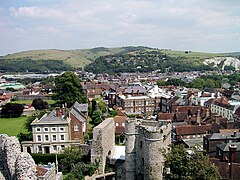Lewes, England
| Lewes | |
|---|---|
 Lewes viewed from Lewes Castle |
|
 Shield of Lewes |
|
| Lewes shown within East Sussex | |
| Area | 11.4 km2 (4.4 sq mi) |
| Population | 17,297 (Parish-2011) |
| • Density | 3,679/sq mi (1,420/km2) |
| Demonym | Lewesian |
| OS grid reference | TQ420104 |
| • London | 44 miles (71 km) N |
| Civil parish |
|
| District | |
| Shire county | |
| Region | |
| Country | England |
| Sovereign state | United Kingdom |
| Post town | LEWES |
| Postcode district | BN7 |
| Dialling code | 01273 |
| Police | Sussex |
| Fire | East Sussex |
| Ambulance | South East Coast |
| EU Parliament | South East England |
| UK Parliament | |
| Website | http://www.lewes-tc.gov.uk/ |
Lewes /ˈluːᵻs/ is the county town of the administrative county of East Sussex, in England, and historically all of Sussex. It is a civil parish and is the centre of the Lewes local government district. The settlement has a history as a bridging point and as a market town, and today as a communications hub and tourist-orientated town. The town was the site of the Battle of Lewes in 1264. The town has landmarks including Lewes Castle and a 15th-century bookshop. At the 2001 census it had a population of 15,988, increasing to 17,297 at the 2011 Census.
Archaeological evidence points to prehistoric dwellers in the area. Scholars think that the Roman settlement of Mutuantonis was here, as quantities of artefacts have been discovered in the area. The Saxons built a castle, having first constructed its motte as a defensive point over the river; they gave the town its name.
After the Norman invasion, William the Conqueror rewarded William de Warenne, 1st Earl of Surrey, with the Rape of Lewes, a swathe of land along the River Ouse from the coast to the Surrey boundary. He built Lewes Castle on the Saxon site; and he and his wife, Gundred also founded the Priory of St Pancras, a Cluniac monastic house, in about 1081. Lewes was the site of a mint during the Late Anglo-Saxon period and thereafter a mint during the early years after the Norman invasion. In 1148 the town was granted a charter by King Stephen. The town became a port with docks along the Ouse River.
...
Wikipedia

